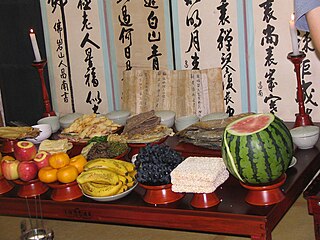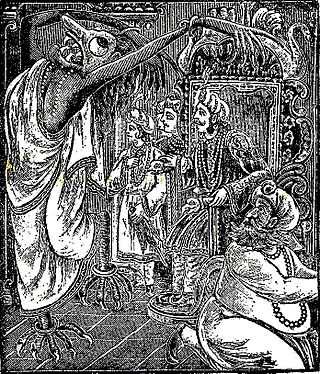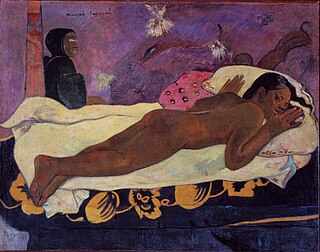
A demon is a malevolent supernatural entity. Historically, belief in demons, or stories about demons, occurs in religion, occultism, literature, fiction, mythology, and folklore; as well as in media such as comics, video games, movies, and television series.

A ghost is the soul or spirit of a dead person or non-human animal that is believed to be able to appear to the living. In ghostlore, descriptions of ghosts vary widely, from an invisible presence to translucent or barely visible wispy shapes to realistic, lifelike forms. The deliberate attempt to contact the spirit of a deceased person is known as necromancy, or in spiritism as a séance. Other terms associated with it are apparition, haunt, phantom, poltergeist, shade, specter, spirit, spook, wraith, demon, and ghoul.

A fairy is a type of mythical being or legendary creature found in the folklore of multiple European cultures, a form of spirit, often described as metaphysical, supernatural, or preternatural.
This article is about the spiritual beliefs, histories and practices in Kwakwaka'wakw mythology. The Kwakwaka'wakw are a group of Indigenous nations, numbering about 5,500, who live in the central coast of British Columbia on northern Vancouver Island and the mainland. Kwakwaka'wakw translates into "Kwak'wala-speaking tribes." However, the individual tribes are single autonomous nations and do not view themselves collectively as one group.
Dinka spirituality is the traditional religion of the Dinka people, an ethnic group of South Sudan. They belong to the Nilotic peoples, which is a group of cultures in Southern Sudan and wider Eastern Africa. The Dinka people largely rejected or ignored Islamic teachings, as Abrahamic religious beliefs were incompatible with their society, culture and traditional beliefs.
Demonology is the study of demons within religious belief and myth. Depending on context, it can refer to studies within theology, religious doctrine, or occultism. In many faiths, it concerns the study of a hierarchy of demons. Demons may be nonhuman, separable souls, or discarnate spirits which have never inhabited a body. A sharp distinction is often drawn between these two classes, notably by the Melanesians, several African groups, and others. The Islamic jinn, for example, are not reducible to modified human souls. At the same time these classes are frequently conceived as producing identical results, e.g. diseases.

La Llorona is a Mexican vengeful ghost who is said to roam near bodies of water mourning her children who she drowned in a jealous rage after discovering her husband was cheating on her.

Hungry ghost is a term in Buddhism, and Chinese traditional religion, representing beings who are driven by intense emotional needs in an animalistic way. The terms 餓鬼èguǐ literally "hungry ghost", are the Chinese translation of the term preta in Buddhism. "Hungry ghosts" play a role in Chinese Buddhism and Taoism as well as in Chinese folk religion. The term is not to be confused with the generic term for "ghost" or damnation, 鬼guǐ. The understanding is that all people become such a regular ghost when they die, and would then slowly weaken and eventually die a second time.

Preta, also known as hungry ghost, is the Sanskrit name for a type of supernatural being described in Hinduism, Buddhism, Taoism, and Chinese folk religion as undergoing suffering greater than that of humans, particularly an extreme level of hunger and thirst. They have their origins in Indian religions and have been adopted into East Asian religions via the spread of Buddhism. Preta is often translated into English as "hungry ghost" from the Chinese and East Asian adaptations. In early sources such as the Petavatthu, they are much more varied. The descriptions below apply mainly in this narrower context. The development of the concept of the preta started with just thinking that it was the soul and ghost of a person once they died, but later the concept developed into a transient state between death and obtaining karmic reincarnation in accordance with the person's fate. In order to pass into the cycle of karmic reincarnation, the deceased's family must engage in a variety of rituals and offerings to guide the suffering spirit into its next life. If the family does not engage in these funerary rites, which last for one year, the soul could remain suffering as a preta for the rest of eternity.

There are many Malay ghost myths, remnants of old animist beliefs that have been shaped by Hindu-Buddhist cosmology and later Muslim influences, in the modern states of Brunei, Indonesia, Malaysia, Singapore and among the Malay diaspora in neighbouring Southeast Asian countries. The general word for ghost is hantu, of which there exist a wide variety. Some ghost concepts such as the female vampires pontianak and penanggal are shared throughout the region. While traditional belief does not consider all ghosts as necessarily evil, Malaysian popular culture tends to categorise them all as types of evil djinn.
Hantu Air, Puaka Air or Mambang Air is the Malay translation for Spirit of the Water or Water Ghost, which according to animist traditions in Maritime Southeast Asia, is the unseen inhabitant of watery places such as rivers, lakes, seas, swamps and even ditches. Communication between humans and Hantu Air occur in situations based on the well-being of an environment and can be positive or negative. Water spirits are called on and communicated with through ceremonies, rituals, incantations, and in extreme cases exorcisms. Hantu Air is associated with bad things happening to people including missing persons, drowning, flooding and many other incidents.

Jesa is a ceremony commonly practiced in China and Korea. Jesa functions as a memorial to the ancestors of the participants. Jesa are usually held on the anniversary of the ancestor's death. The majority of Catholics, Buddhists and nonbelievers practice ancestral rites, although Protestants do not. The Catholic ban on ancestral rituals was lifted in 1939, when Pope Pius XII formally recognized ancestral rites as a civil practice. Many Korean Christians, particularly Protestants, no longer practice this rite. Christians generally, and Muslims avoid the rites, and many emigrants avoid the rites.

Ghosts are an important and integral part of the folklore of the socio-cultural fabric of the geographical and ethno-linguistic region of Bengal which presently consists of Bangladesh and the Indian states of West Bengal and Tripura. Fairy tales, both old and new, often use the concept of ghosts. References to ghosts are often found in modern-day Bengali literature, cinema, radio and television media. There are also alleged haunted sites in the region. The common word for ghosts in Bengali is bhoot or bhut. This word has an alternative meaning: 'past' in Bengali. Also, the word Pret is used in Bengali to mean ghost. In Bengal, ghosts are believed to be the unsatisfied spirits of human beings who cannot find peace after death or the souls of people who died in unnatural or abnormal circumstances like murders, suicides or accidents. Non-human animals can also turn into ghosts after their death. But they are often associated with good luck and wealth in Bangladesh.

Kwakwaka'wakw art describes the art of the Kwakwaka'wakw peoples of British Columbia. It encompasses a wide variety of woodcarving, sculpture, painting, weaving and dance. Kwakwaka'wakw arts are exemplified in totem poles, masks, wooden carvings, jewelry and woven blankets. Visual arts are defined by simplicity, realism, and artistic emphasis. Dances are observed in the many rituals and ceremonies in Kwakwaka'wakw culture. Much of what is known about Kwakwaka'wakw art comes from oral history, archeological finds in the 19th century, inherited objects, and devoted artists educated in Kwakwaka'wakw traditions.

There was widespread belief in ghosts in Polynesian culture, some of which persists today. After death, a person's ghost would normally travel to the sky world or the underworld, but some could stay on earth. In many Polynesian legends, ghosts were often involved in the affairs of the living. Ghosts might also cause sickness or even invade the body of ordinary people, to be driven out through strong medicines.

Chinese folklore features a rich variety of ghosts, monsters, and other supernatural creatures. According to traditional beliefs a ghost is the spirit form of a person who has died. Ghosts are typically malevolent and will cause harm to the living if provoked. Many Chinese folk beliefs about ghosts have been adopted into the mythologies and folklore of neighboring East Asian cultures, notably Japan, Korea, and Vietnam. Beliefs about ghosts are closely associated with Chinese ancestor worship, where much have been incorporated into Buddhism and in turn influenced and created uniquely Chinese Buddhist beliefs about the supernatural.

West African mythology is the body of myths of the people of West Africa. It consists of tales of various deities, beings, legendary creatures, heroes and folktales from various ethnic groups. Some of these myths traveled across the Atlantic during the period of the Trans-Atlantic slave trade to become part of Caribbean, Cuban and Brazilian mythology.
'Kwakwaka'wakw music is a sacred and ancient art of the Kwakwaka'wakw peoples that has been practiced for thousands of years. The Kwakwaka'wakw are a collective of twenty-five nations of the Wakashan language family who altogether form part of a larger identity comprising the Indigenous Peoples of the Pacific Northwest Coast, located in what is known today as British Columbia, Canada.

In Islam, the belief that spiritual entities—particularly, jinn—can possess a person,, is widespread; as is the belief that the jinn and devils can be expelled from the possessed person through exorcism. This practice is called al-'azm or ruqya and exorcists are called raqi.













